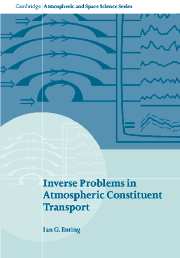Book contents
- Frontmatter
- Contents
- Preface
- Part A Principles
- Chapter 1 Introduction
- Chapter 2 Atmospheric transport and transport models
- Chapter 3 Estimation
- Chapter 4 Time-series estimation
- Chapter 5 Observations of atmospheric composition
- Chapter 6 The sources and sinks
- Chapter 7 Problem formulation
- Chapter 8 Ill-conditioning
- Chapter 9 Analysis of model error
- Chapter 10 Green's functions and synthesis inversion
- Chapter 11 Time-stepping inversions
- Chapter 12 Non-linear inversion techniques
- Chapter 13 Experimental design
- Part B Recent applications
- Appendices
- Solutions to exercises
- References
- Index
Chapter 3 - Estimation
Published online by Cambridge University Press: 05 November 2009
- Frontmatter
- Contents
- Preface
- Part A Principles
- Chapter 1 Introduction
- Chapter 2 Atmospheric transport and transport models
- Chapter 3 Estimation
- Chapter 4 Time-series estimation
- Chapter 5 Observations of atmospheric composition
- Chapter 6 The sources and sinks
- Chapter 7 Problem formulation
- Chapter 8 Ill-conditioning
- Chapter 9 Analysis of model error
- Chapter 10 Green's functions and synthesis inversion
- Chapter 11 Time-stepping inversions
- Chapter 12 Non-linear inversion techniques
- Chapter 13 Experimental design
- Part B Recent applications
- Appendices
- Solutions to exercises
- References
- Index
Summary
It is sometimes considered a paradox that the answer depends not only on the observations but on the question; – it should be a platitude.
H. Jeffries: Theory of Probability.General
In dealing with the real world, we very quickly find that it fails to exhibit the exact relations of applied mathematics. All of the quantities involved are subject to uncertainty and, in the case of ill-conditioned inverse problems, some quantities are subject to very great uncertainty. We need to represent our uncertainty, i.e. our lack of exact information, in statistical terms. Our analysis of trace-gas distributions will be in terms of estimates and these estimates will be regarded as being subject to statistical uncertainty. This chapter discusses the process of obtaining such estimates, first by setting up a general framework and then by considering several important special cases.
Our terminology for defining the general problem of interpreting indirect information is that there is a set of observations, denoted by a vector c, suggesting concentration data, from which we wish to infer some model parameters, denoted by a vector x. (These model parameters will often be more general than a set of source strengths, s.)
The simplest form of analysis is that we wish to use the data, c, to give us an estimate of the parameters, x, making use of a theoretical relation between the observations and the parameters. Since we do not expect the theoretical relations to predict the realworld values exactly, we distinguish these theoretical predictions by denoting them m, or more specifically m(x) when we wish to denote their dependence on the parameters.
- Type
- Chapter
- Information
- Inverse Problems in Atmospheric Constituent Transport , pp. 41 - 60Publisher: Cambridge University PressPrint publication year: 2002
- 1
- Cited by

